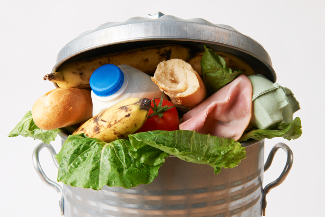Member State Page : Hungary
Last updated on the 29/09/2023

Per capita: 93 kg in 2020
In total: 905 068 tonnes in 2020
In total: 883 486 tonnes in 2021

Primary production: 16 587 tonnes in 2020 Processing and manufacturing: 187 391 tonnes in 2020
Retail and other distribution of food: 41 952 tonnes in 2020
Restaurants and food services: 19 331 tonnes in 2020
Households: 639 806 tonnes in 2020

Currently not set
Target
The development of a strategy, in which national food waste reduction targets will be set, is in progress. The targets will refer to the Sustainable Development Goal 12.3 set by the United Nations.
Measure
The National Food Chain Safety Office (Nébih) is the responsible entity for collecting and reporting data on food losses and food waste in the household sector.
Two food waste measurement studies at household level were conducted in 2016 and 2019, by applying the methodology developed under the EU-funded FUSIONS project. According to 2019 data, food waste generated by Hungarian households was estimated at 65.5 kilos per capita and nearly half of it could be avoided. As compared to the first study in 2016, which employed the same methodology, a 4% decrease was observed, despite the significant economic expansion.
Food waste data from other sectors of the food supply chain is collected by the Ministry for Innovation and Technology.
Act
Food waste prevention is part of the following policies: the national framework strategy for sustainable development and the national waste management plan (2021-2027). A dedicated national food waste prevention programme called ‘Wasteless’ has been running since 2016 organized by the National Food Chain Safety Office. The main objectives of the project are to increase consumer awareness on food waste and to change current behavioural patterns that lead to food waste, with a special focus on primary school education, collecting good practices for food waste prevention and reduction and enhancing collaboration with other EU Member States.
The main priorities for food loss and waste prevention actions in Hungary are to:
- set a baseline for food waste levels for households and the food supply chain in Hungary;
- implement the food waste hierarchy;
- demonstrate the efficiency of the voluntary approach as regards the reduction of waste in the food supply chain;
- raise awareness of food waste issues and changing consumers’ attitudes;
- identify and address hotspots in retail supply chains to prevent waste;
- work with the hospitality and tourism industry to improve practices and influence consumer behaviour to prevent waste; and
- engage the entire food supply chain and recruit new members for the forum Food is Value.
The Ministry of Agriculture and the Hungarian Food Bank Association have jointly launched the forum Food is Value (framework for action, EN) in Hungary in 2014, in order to reduce food losses and waste. Members are required to sign a declaration through which they commit to a voluntary agreement to reduce food losses and food waste in their respective stages of the food value chain. The forum aims to engage members to:
- actively reduce food loss and food waste;
- highlight the importance of the current issue and shape public opinions and attitudes in this regard;
- enhance knowledge management and the flow of information among all stakeholders concerned;
- identify issues and possible solutions along the whole supply chain from primary production to consumers;
- valorise unavoidable waste;
- identify and develop good practices in Hungary and abroad, promote and adapt these for wider uptake in Hungary.
The National Food Chain Safety Office (Nébih) started its ‘Wasteless’ programme with the financial support of the European Union’s LIFE programme, with the aim to decrease the amount food waste. Under the programme, several awareness-raising actions have been organised, including a consumer campaign, a school programme (development of educational materials for teachers and pupils, events, activities etc.), an award for food waste prevention initiatives. Furthermore, the project also facilitated the exchange of good practices within different working groups, which led to the creation of guidelines for food waste reduction in various sectors (catering, food industry, trade and community).
According to Act LXXXI of 1996 7§ (1), a tax reduction is applicable for food donation activities carried out by food business operators. The donations are not subject to VAT.
In the area of research and innovation, researchers carried out a study aiming to explore behavioural patterns behind household food waste using partial least square structural equation modelling (PLS-SEM).
